Partial Function Application
Partial Function Application is a technique in which a function binds a few of its arguments and returns a function taking fewer arguments. This technique is related to a technique used in functional languages called currying.
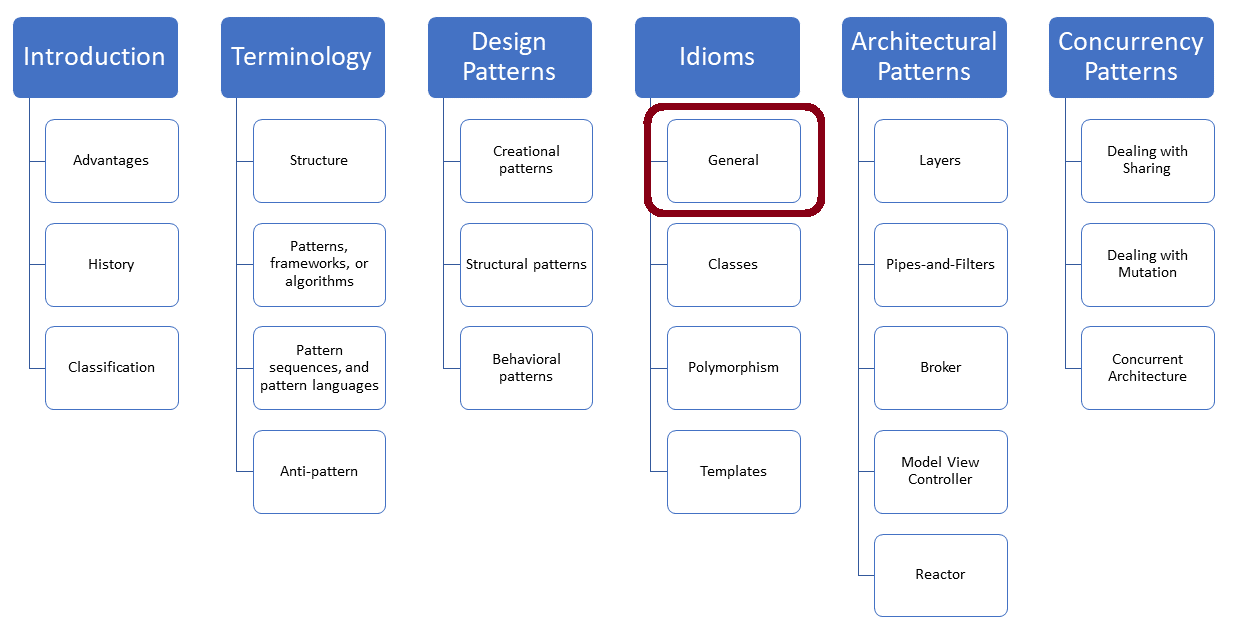
A few weeks ago, I had a discussion with a few of my readers. One reader said that I should write about Partial Function Applications. Another reader mentioned that C++ does not support function applications. This is wrong. C++ supports Partial Function Application. Consequently, I am writing today about std::function, std::bind, std::bind_front, lambdas, auto, and currying.
Let me start with a bit of theory.
Currying
Partial Function application is quite similar to a technique called currying. Currying is a well-known technique used in functional languages such as Haskell. It stands for a technique in which a function that takes more than one argument will successively be transformed into a series of functions taking only one argument. Therefore, a programming language such as Haskell has only functions taking one argument. I hear your question. How is it possible to implement a function such as add which needs two arguments? The magic is happening implicitly. Functions that need n arguments are transformed into functions returning a function that only needs n -1 arguments. The first element is evaluated in this transformation.
The name currying is coined by the mathematician Haskell Curry and Moses Schönfinkel. Currying is named after the family name of Haskell Curry; Haskell after his first name. Sometimes, currying is also called schönfinkeln.
Partial Function Application is more powerful than currying because you can evaluate arbitrary function arguments. Since C++11, C++ supports std::function and std::bind.
std::bind
std::bind enables you to create callables in various ways. You can
- bind function argument at arbitrary positions,
- reorder the sequence of the function arguments,
- introduce placeholders for function arguments,
- partially evaluate functions.
Furthermore, you can
- directly invoke the new callable,
- use the callable in an algorithm of the Standard Template Library (STL),
- store the callable in
std::function.
Before I show you an example, I have to introduce std::function:
 Modernes C++ Mentoring
Modernes C++ Mentoring
Do you want to stay informed: Subscribe.
std::functionis a polymorphic function wrapper. It can take arbitrary callables and give them a name. Callables are all entities that behave like a function. In particular, these are lambda expressions, function objects, or functions themselves.std::functionis required if you have to specify the type of a callable.
Now, I’m done with the theory and can show an example of Partial Function Application:
// bindAndFunction.cpp #include <functional> #include <iostream> double divMe(double a, double b){ return double(a/b); } using namespace std::placeholders; // (1) int main(){ std::cout << '\n'; // invoking the function object directly std::cout << "1/2.0= " << std::bind(divMe, 1, 2.0)() << '\n'; // (2) // placeholders for both arguments // (3) std::function<double(double, double)> myDivBindPlaceholder= std::bind(divMe, _1, _2); std::cout << "1/2.0= " << myDivBindPlaceholder(1, 2.0) << '\n'; // placeholders for both arguments, swap the arguments // (4) std::function<double(double, double)> myDivBindPlaceholderSwap= std::bind(divMe, _2, _1); std::cout << "1/2.0= " << myDivBindPlaceholderSwap(2.0, 1) << '\n'; // placeholder for the first argument // (5) std::function<double(double)> myDivBind1St= std::bind(divMe, _1, 2.0); std::cout<< "1/2.0= " << myDivBind1St(1) << '\n'; // placeholder for the second argument // (6) std::function<double(double)> myDivBind2Nd= std::bind(divMe, 1.0, _1); std::cout << "1/2.0= " << myDivBind2Nd(2.0) << '\n'; std::cout << '\n'; }
In order to use the simple notation _1, _2 for the placeholders std::placeholders::_1, std::placeholders::_2 in the source code, I have to introduce the namespace std::placeholders in line 1.
I bind in line 2 in the expression std::bind(divMe, 1, 2.0) the arguments 1 and 2.0 to the function divMe and invoke them in place. Lines 3, 4, 5, and 6 follow a similar strategy, but I give the created callables a name using std::function, and invoke them finally. A template signature like double(double, double) (line 4) or double(double) (lines 5 and 6) stands for the type of callable that std::function accepts. double(double, double) is a function taking two doubles and returning a double.
In particular, the last two examples (lines 5 and 6) in which std::function gets a function of arity two and returns a function of arity one is quite astonishing. The arity of a function is the number of arguments a function gets. std::bind evaluates in both calls only one argument and uses for the non-evaluated one a placeholder. This technique is called Partial Function Application.
In the end, here is the output of the program.
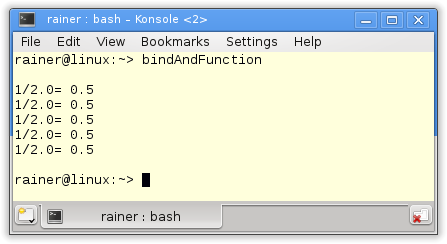
There is another way in C++11 to use Partial Function Application: lambda expressions.
Lambda Expressions
std::bind and std::function are almost superfluous with C++11. You can use lambda expressions instead of std::bind, and almost always auto instead of std::function. Here is the equivalent program based on auto, and lambda expressions.
// lambdaAndAuto.cpp #include <functional> #include <iostream> double divMe(double a, double b){ return double(a/b); } using namespace std::placeholders; int main(){ std::cout << '\n'; // invoking the function object directly std::cout << "1/2.0= " << [](int a, int b){ return divMe(a, b); }(1, 2.0) << '\n'; // placeholders for both arguments auto myDivBindPlaceholder= [](int a, int b){ return divMe(a, b); }; std::cout << "1/2.0= " << myDivBindPlaceholder(1, 2.0) << '\n'; // placeholders for both arguments, swap the arguments auto myDivBindPlaceholderSwap= [](int a, int b){ return divMe(b, a); }; std::cout << "1/2.0= " << myDivBindPlaceholderSwap(2.0, 1) << '\n'; // placeholder for the first argument auto myDivBind1St= [](int a){ return divMe(a, 2.0); }; std::cout<< "1/2.0= " << myDivBind1St(1) << '\n'; // placeholder for the second argument auto myDivBind2Nd= [](int b){ return divMe(1, b); }; std::cout << "1/2.0= " << myDivBind2Nd(2.0) << '\n'; std::cout << '\n'; }
Let me say write a few words about the lambda expressions. The expression [](int a, int b){ return divMe(a, b); }(1, 2.0) defines a lambda exepression that executes divMe. The trailing braces invoke the lambda expression just in place using the arguments 1 and 2.0. On the contrary, the remaining lambda expressions are invoked in the subsequent lines. You can use a lambda expression to bind any argument of the underlying function.
So far, I have applied Partial Function application with std::bind and lambda expressions. In C++20, there is a new variation of std::bind:
std::bind_front
std::bind_front creates a callable. std::bind_front can have an arbitrary number of arguments and binds its arguments to the front. You may wonder why we have std::bind_front because we have since C++11 std::bind, which can also bind to the front. Here is the point. First, std::bind_front is easier to use because it does not need placeholders, and second, std::bind_front propagates an exception specification of the underlying callable.
The following program exemplifies that you can replace std::bind_front with std::bind, or lambda expressions.
// bindFront.cpp #include <functional> #include <iostream> int plusFunction(int a, int b) { return a + b; } auto plusLambda = [](int a, int b) { return a + b; }; int main() { std::cout << '\n'; auto twoThousandPlus1 = std::bind_front(plusFunction, 2000); // (1) std::cout << "twoThousandPlus1(20): " << twoThousandPlus1(20) << '\n'; auto twoThousandPlus2 = std::bind_front(plusLambda, 2000); // (2) std::cout << "twoThousandPlus2(20): " << twoThousandPlus2(20) << '\n'; auto twoThousandPlus3 = std::bind_front(std::plus<int>(), 2000); // (3) std::cout << "twoThousandPlus3(20): " << twoThousandPlus3(20) << '\n'; std::cout << "\n\n"; using namespace std::placeholders; auto twoThousandPlus4 = std::bind(plusFunction, 2000, _1); // (4) std::cout << "twoThousandPlus4(20): " << twoThousandPlus4(20) << '\n'; auto twoThousandPlus5 = [](int b) { return plusLambda(2000, b); }; // (5) std::cout << "twoThousandPlus5(20): " << twoThousandPlus5(20) << '\n'; std::cout << '\n'; }
Each call (lines 1 – 5) gets a callable taking two arguments and returns a callable taking only one argument because the first argument is bound to 2000. The callable is a function (1), a lambda expression (2), and a predefined function object (line 3). _1 stands for the missing argument. With lambda expression (line 5), you can directly apply one argument and provide an argument b for the missing parameter. Regarding readability, is std::bind_front easier to use than std::bind, or a lambda expression.
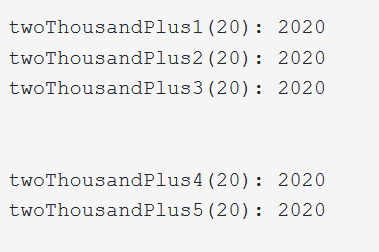
What’s Next?
Argument-Dependent Lookup (ADL), also known as Koening Lookup is a set of “magical” rules for the lookup of unqualified functions based on their function arguments.
Thanks a lot to my Patreon Supporters: Matt Braun, Roman Postanciuc, Tobias Zindl, G Prvulovic, Reinhold Dröge, Abernitzke, Frank Grimm, Sakib, Broeserl, António Pina, Sergey Agafyin, Андрей Бурмистров, Jake, GS, Lawton Shoemake, Jozo Leko, John Breland, Venkat Nandam, Jose Francisco, Douglas Tinkham, Kuchlong Kuchlong, Robert Blanch, Truels Wissneth, Mario Luoni, Friedrich Huber, lennonli, Pramod Tikare Muralidhara, Peter Ware, Daniel Hufschläger, Alessandro Pezzato, Bob Perry, Satish Vangipuram, Andi Ireland, Richard Ohnemus, Michael Dunsky, Leo Goodstadt, John Wiederhirn, Yacob Cohen-Arazi, Florian Tischler, Robin Furness, Michael Young, Holger Detering, Bernd Mühlhaus, Stephen Kelley, Kyle Dean, Tusar Palauri, Juan Dent, George Liao, Daniel Ceperley, Jon T Hess, Stephen Totten, Wolfgang Fütterer, Matthias Grün, Ben Atakora, Ann Shatoff, Rob North, Bhavith C Achar, Marco Parri Empoli, Philipp Lenk, Charles-Jianye Chen, Keith Jeffery, Matt Godbolt, Honey Sukesan, bruce_lee_wayne, Silviu Ardelean, schnapper79, Seeker, and Sundareswaran Senthilvel.
Thanks, in particular, to Jon Hess, Lakshman, Christian Wittenhorst, Sherhy Pyton, Dendi Suhubdy, Sudhakar Belagurusamy, Richard Sargeant, Rusty Fleming, John Nebel, Mipko, Alicja Kaminska, Slavko Radman, and David Poole.
| My special thanks to Embarcadero |  |
| My special thanks to PVS-Studio |  |
| My special thanks to Tipi.build |  |
| My special thanks to Take Up Code |  |
| My special thanks to SHAVEDYAKS |  |
Modernes C++ GmbH
Modernes C++ Mentoring (English)
Rainer Grimm
Yalovastraße 20
72108 Rottenburg
Mail: schulung@ModernesCpp.de
Mentoring: www.ModernesCpp.org




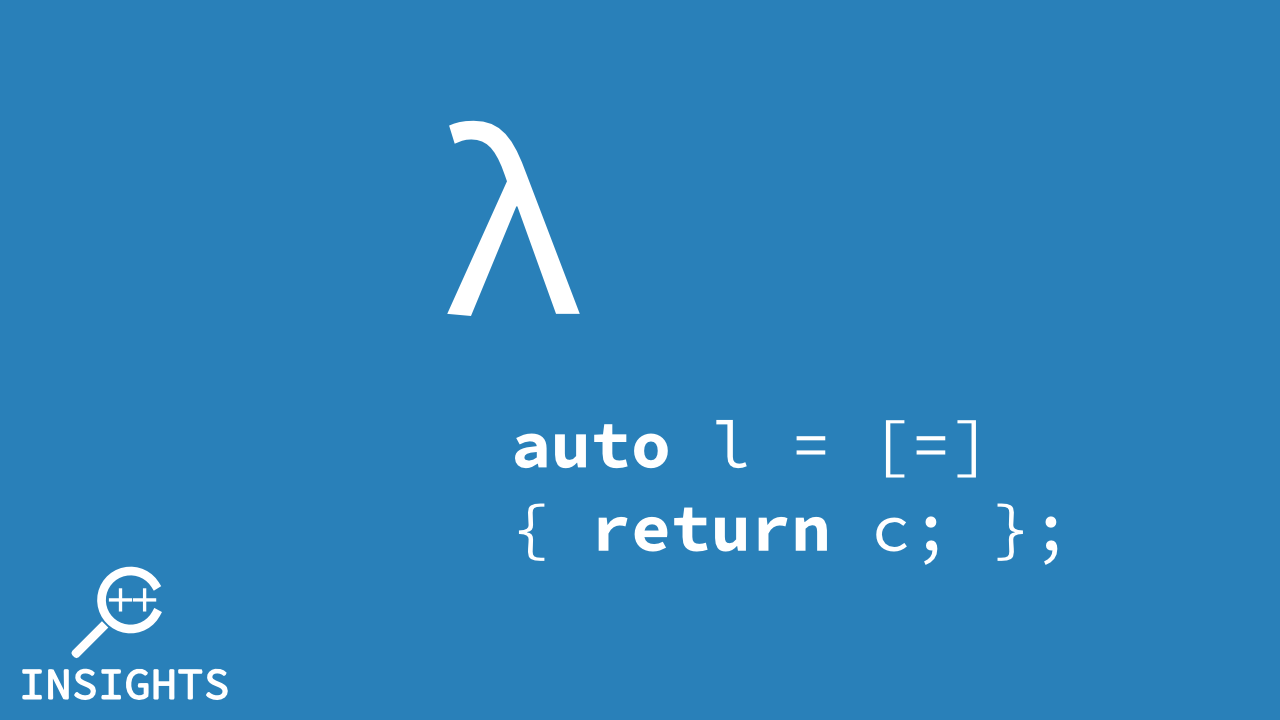

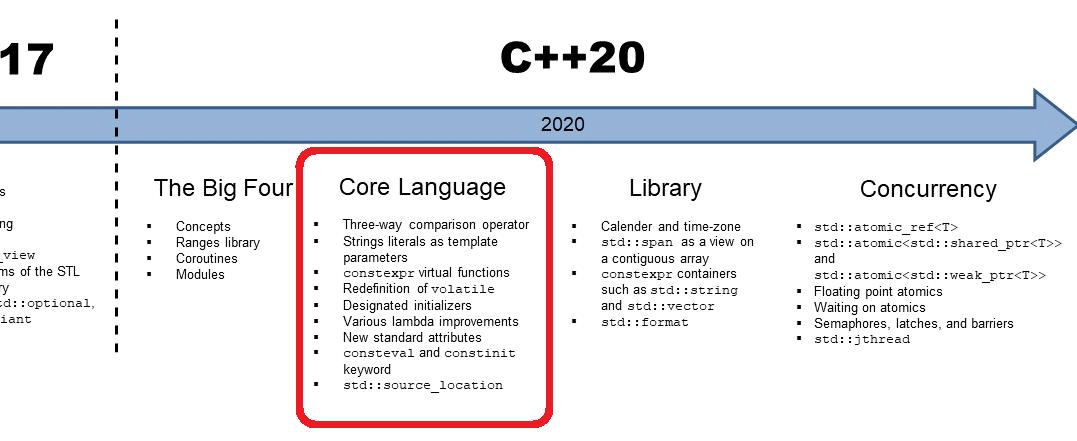


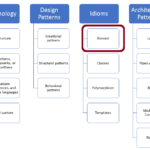
Leave a Reply
Want to join the discussion?Feel free to contribute!